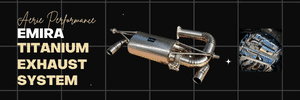I’m sorry but I read your response differently. “It’s a recipe for something bad to eventually happen” sounds like a bit of mud slinging. Seemed a bit much - especially when you don’t have any products yet. We welcome all quality vendors and appreciate all the hard work you guys put in designing and bringing things to market. Just asking to be respectful to the others here.
This isn't mud slinging, this is just fact. I am providing information from the ECU, and already well known knowledge on how lotus does their previous year ECU calibrations, and information about these engines. You can ask any of the other shops that are well versed in Lotus vehicles.
Pointing out flaws or pointing out potential issues is not being disrespectful. It is my belief, that many owners here simply do not understand the inner workings of all this, and they should. My having a product or not is irrelevant. We have a product for every other lotus already, including the Evora GT which the Emira is basically just an updated version of.
This is not to advertise our product against theirs whatsoever, this is just stating how it works and how it could end up with something bad happening. Bad things can happen on a bad ECU tune as well, but the ECU tables gives far more range of actual tuning capability while maintaining safety.
1. Lotus ECUs shut off knock sensors above a certain RPM on many of their calibrations (far short of the rev limit) That means there is the possibility that on one of the maps that is aggressively lowering load, you could be detonating at high RPM and the ECU ***will NOT save you***.
2. These engines already run near, or at near peak power lean ratios (12.7, 12.5) only tapering at higher RPM or under heavy catalyst heating.
3. The device you guys are using *is* skewing sensor data, this makes the ECU Calculate less load, therefore all tables that use load as an axis are using wrong table values.
4. This works for ignition and fuel, by lower load you get more ignition, as the ECU thinks their is less airflow. As a result you also run much leaner AFR in boost.
5. There are accounts of people having heat management issues, we have also had people PM us about some issues or lack of power results from this device.
6. Under ideal conditions, the device can provide you more power by leaning out AFR and increasing ignition.
LEAN AFR + high ignition = Heat.
Heat = Knock.
Heat = power loss.
Heat + boost + high ignition + lean AFR = potential engine damage.
If I am wrong and the product works and is safe, then there should be no issues running any of the maps it provides and you shouldn't be having heat management problems.
As we have already pointed out, we are working on heat management products because this vehicle *already* has some heat management issues in *stock* configuration. When you add a device that *increases heat* you may see consequences.
Again, this is not mud slinging whatsoever, this is just basic tuning fact.
I have been in the business of calibrating and reverse engineering for 15 years. The JB4 generally works well on Turbocharged vehicles that use *incredibly complex* calibrations that have *hundreds* of additional algorithms, safety controls and exceptionally well modelled cylinder flow, fuel, air, etc, where raising the boost on one of these turbocharged engines can directly result in more power with absolutely no ill effect.
However Lotus ECUs and lotus calibration code IS NOT LIKE standard manufacturer calibrations whatsoever.
There are minimal additional safeties, there are minimal additional tables for flow models, fuel algorithms ,etc.
As an example, a 2021 Lotus Evora ECU has about 500 tables to calculate *basically every* important parameter.
Now compare to a toyota, or mercedes turbocharged engine that has over 30,000 tables.
Lotus calibrations are *BARE BONES* and basically an "OEM Race ECU."
None of this is a knock at the product directly. The car has heat management issues and this product is contributing heat by its method of increasing power.
Heat is the #1 contributor to engine damage on high horsepower engines.
heat control is so important as a matter of fact that some OEM Calibrations have over 1000, 2000, 5000 tables dedicated to managing it. There are more heat management tables in a Toyota ECU than the Entire lotus ecu.
I think the JB4 could easily get around this problem by making it "revert back to stock if too hot." That way when not hot = more power. Too hot = stock. The problem with that would be power would be highly variable...because even stock you lose power with additional heat.







